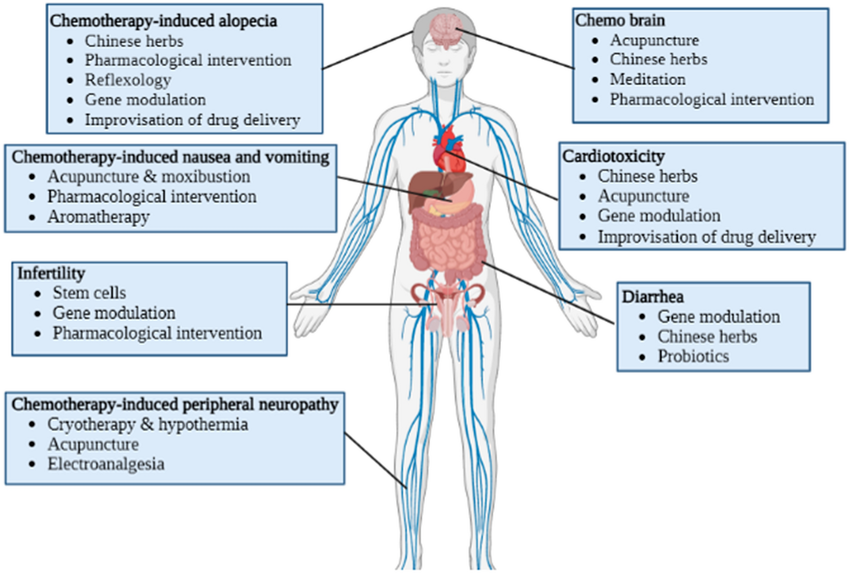Chemotherapy is a cornerstone of cancer treatment, designed to target and destroy cancer cells. However, while effective, it comes with a range of potential side effects. Understanding these side effects and knowing how to manage them can make the treatment process more manageable. In this blog post, we’ll delve into what to expect during chemotherapy and offer practical tips for finding relief.
Common Side Effects of Chemotherapy
Nausea and Vomiting
Nausea and vomiting are among the most common side effects of chemotherapy. These symptoms can vary in intensity and may occur shortly after treatment or days later. Modern anti-nausea medications, such as ondansetron and granisetron, are highly effective and can significantly reduce or even prevent nausea.
Fatigue
Chemotherapy can cause profound fatigue that doesn’t necessarily improve with rest. This fatigue can be due to the body’s response to the treatment, anemia, or the overall stress of the illness. To combat fatigue, it’s important to balance activity with rest. Gentle exercises, like walking or yoga, can help improve energy levels.
Hair Loss
Hair loss is a well-known side effect of chemotherapy, though not all patients experience it. This occurs because chemotherapy targets all rapidly dividing cells, including those in hair follicles. Wearing a wig, scarf, or hat can provide comfort and confidence. Additionally, scalp cooling systems are available that may help reduce hair loss.
Mouth Sores and Changes in Taste
Chemotherapy can cause sores in the mouth, as well as changes in taste, making food less enjoyable. Maintaining good oral hygiene, using a soft-bristled toothbrush, and avoiding spicy or acidic foods can help. Rinsing the mouth with a saltwater solution can also soothe mouth sores.
Digestive Issues
Diarrhea and constipation are also common during chemotherapy. These issues can be managed by maintaining a balanced diet and staying hydrated. Over-the-counter medications can help with diarrhea while increasing fiber intake can alleviate constipation. Always consult with your healthcare provider before starting any new medications.
Skin Changes
Chemotherapy may lead to skin changes, including dryness, sensitivity, or rashes. Using gentle, moisturizing lotions and avoiding harsh soaps can help protect the skin. It’s also advisable to avoid excessive sun exposure and use sunscreen to prevent skin damage.
Increased Risk of Infections
Chemotherapy can lower the body’s white blood cell count, making it more susceptible to infections. It’s important to practice good hygiene, such as frequent hand washing, and to avoid crowded places or individuals who are ill. Your doctor may recommend medication to boost your white blood cell count.
Neuropathy
Some chemotherapy drugs can lead to peripheral neuropathy, which manifests as tingling, numbness, or pain in the hands and feet. Managing this side effect often includes adjusting medication dosages or using treatments specifically designed to alleviate nerve pain. For those seeking targeted help, neuropathy treatments in Tulsa can offer specialized care to address these symptoms effectively.
Strategies for Finding Relief
Open Communication
Maintaining open communication with your healthcare team is crucial. Inform them about any side effects you’re experiencing. They can adjust your treatment plan or prescribe medications to help manage symptoms.
Nutritional Support
Eating a well-balanced diet can help manage some side effects. Consulting with a nutritionist who specializes in oncology can provide tailored dietary advice to help maintain strength and address specific issues like nausea or mouth sores.
Emotional and Psychological Support
Dealing with chemotherapy’s side effects can be emotionally challenging. Seeking support from counselors, support groups, or mental health professionals can provide valuable coping strategies and emotional relief.
Exercise and Physical Activity
Engaging in light physical activity, as tolerated, can help reduce fatigue and improve overall well-being. Activities like walking, stretching, or gentle yoga can be beneficial.
Rest and Relaxation
Getting adequate rest is essential for managing fatigue. Creating a relaxing environment and practicing stress-reducing techniques such as meditation or deep breathing exercises can also be helpful.
Alternative Therapies
Some patients find relief through complementary therapies, such as acupuncture or massage. Always discuss these options with your healthcare provider to ensure they’re safe and appropriate for your treatment plan.
Practical Aids
Using practical aids, like anti-nausea wristbands or oral care products, can also help alleviate specific symptoms.
In Conclusion
While chemotherapy can present numerous challenges, being informed about potential side effects and knowing how to manage them can make a significant difference in your treatment experience. By working closely with your healthcare team, seeking support, and employing practical strategies, you can better navigate the side effects of chemotherapy and maintain a higher quality of life throughout your treatment journey.

